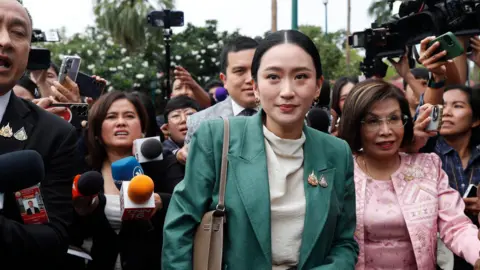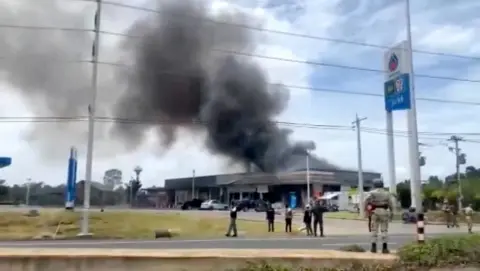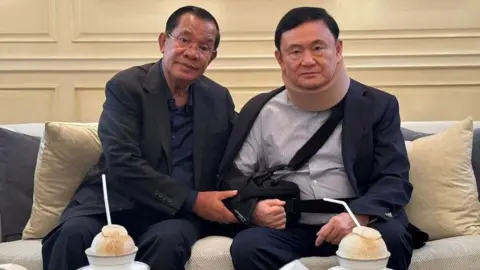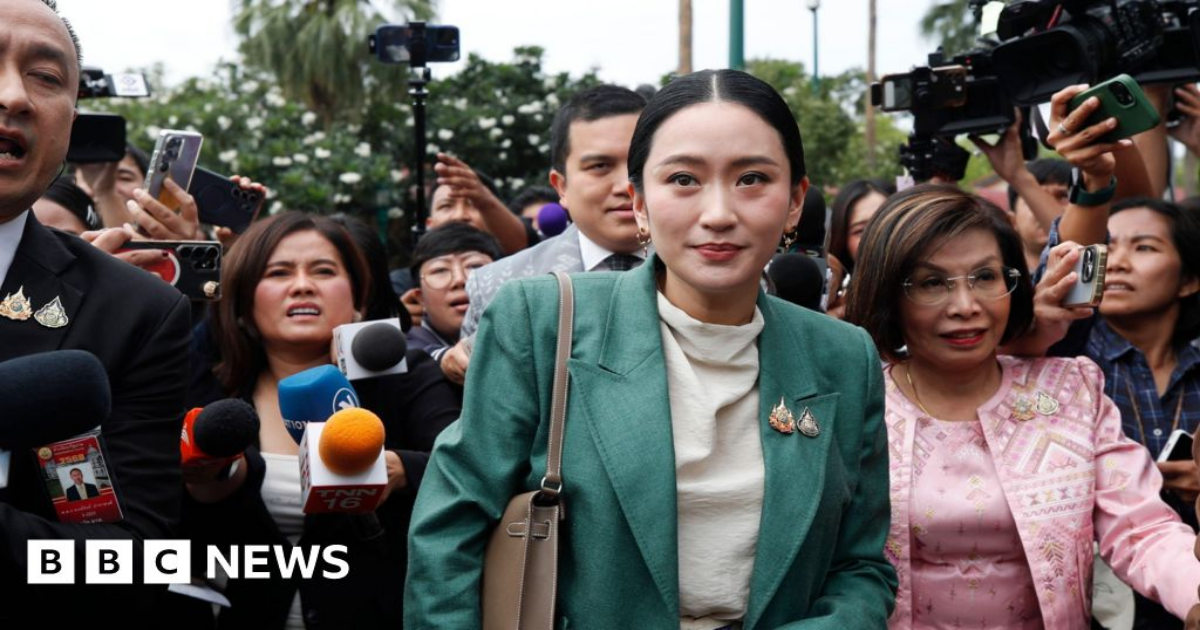Jonathan Head
South East Asia correspondent

 EPA
EPA
Cambodia and Thailand have a history of occasional conflict.
The two countries share a long and forested border with areas that both sides claim. There have been serious exchanges of fire in the past, too – in 2008 and 2011, clashes on a similar scale saw 40 people killed.
However, these were de-escalated relatively quickly.
Even as recently as this May, after an incident in which a Cambodian soldier was killed, both sides looked keen to prevent more violence, with meetings between army commanders from each country aimed at easing the tension.
But on 24 July, it erupted. Thai authorities say 12 people, all civilians apart from one, were killed.
Cambodia has yet to confirm whether it suffered any casualties.
So why has this particular border skirmish – which kicked off after five Thai soldiers were injured in a landmine explosion on Wednesday – spread into something so much larger?
Relations between the two countries deteriorated sharply last month, when Cambodia’s senior leader Hun Sen deeply embarrassed Thai Prime Minister Paetongtarn Shinawatra by leaking a phone conversation between them about the disputed border.
In the conversation, Paetongtarn called him “uncle”, and criticised one of her own military commanders, sparking public anger. She has since been suspended as prime minister and Thailand’s Constitutional Court is considering a petition for her dismissal.
It is not clear why Hun Sen chose to do this, burning a close personal relationship between their two families that goes back decades.

 Reuters
Reuters
Many people have faulted Paetongtarn for her conversation with Hun Sen. She appeared to believe that she could resolve their differences by appealing to his friendship with her father, former prime minister Thaksin Shinawatra.
In the past that friendship was used by Thaksin’s opponents to charge him with putting Cambodia’s interests above those of Thailand.
In 2014, when a government headed by Thaksin’s sister Yingluck was deposed by a military coup, Hun Sen allowed scores of his supporters to seek sanctuary in Cambodia.
The two countries have also cooperated in more shadowy areas.
Last November, Thailand sent six Cambodian dissidents, together with a young child, back to Cambodia, where they were immediately jailed. All were recognised by the United Nations as refugees.
In 2020, a young Thai activist who had fled to Cambodia, Wanchalerm Satsaksit, was abducted and disappeared, it is presumed by Thai operatives.
And the January gunning down of a Cambodian opposition leader in broad daylight in central Bangkok was also seen by activists as an outcome of this understanding between the two countries’ security services.
Against this background, the leaking of Paetongtarn’s conversation appears to have caught the Shinawatra family completely off-guard.
The responses from both Thaksin and Paetongtarn reveal a sense of betrayal. This has led to an increasingly bitter war of words between the two countries.
But it is more than just words.
Thai police have also begun investigating powerful Cambodian business figures alleged to be linked to underworld gambling and scam centres, while trade worth billions of dollars a year has stopped.
At the border itself, there is a heightened risk of more serious clashes between the two armies.
But rather than back off, Cambodia’s Hun Sen seems to have jumped at the opportunity to ramp up rhetoric against Thailand and the Shinawatra family in particular.
He claims to be in possession of secret documents that would incriminate Thaksin – documents he claims could even prove that he insulted the monarchy, an offence which comes with a hefty prison sentence in Thailand.
The Thai government responded by expelling the Cambodian ambassador on Wednesday and recalling its own envoy, setting the stage for the latest confrontation.

 Reuters
Reuters
Hun Sen (left) sits with Thaksin Shinawatra (right)
For now neither side looks willing to step back. In both countries, there is a lack of leadership with the strength and confidence to compromise.
In Prime Minister Hun Manet, Cambodia has the inexperienced son of a former strongman who does not yet have his own authority, while in his father Hun Sen it also has a man who appears willing to push this conflict further in order to burnish his own nationalist credentials.
On the Thai side, the shaky coalition government centred on Thaksin’s party is dealing with a stagnant economy and reeling from the threat of punitive US tariffs. It cannot afford to show weakness in standing up to Cambodia.
Cambodia too is dealing with a struggling economy.
It never fully recovered from the pandemic and tourism – a pillar of its economy – has suffered from the absence of Chinese visitors staying away for fear of being kidnapped and forced to work in scam centres.
And – as with Thailand – now there is the threat of punishing US tariffs impacting the economy further.
But both countries do have experienced politicians in Hun Sen and Thaksin who almost certainly can, when they are both ready, find a way out of this.
We will also have to see whether other members of Asean weigh in on this conflict and try to persuade both countries to de-escalate.
That was originally Asean’s primary purpose – to avoid conflict among its members – and it will be a priority for some of the Asean states at the moment to help these two countries resolve the conflict.
What remains a mystery at this point though is why Hun Sen decided to burn this friendship and inflame this conflict.
Perhaps it was Thailand’s decision to put pressure on scam centres this year, or Thaksin’s ambition to legalize gambling, threatening Cambodia’s own lucrative casino industry.
Or perhaps it was something simpler: a Machiavellian move by one of Asia’s wiliest political survivors, to abandon an ally in Thaksin who has lost much of his influence in Thailand, while at the same time burnishing his nationalist credentials in the eyes of his own people.
